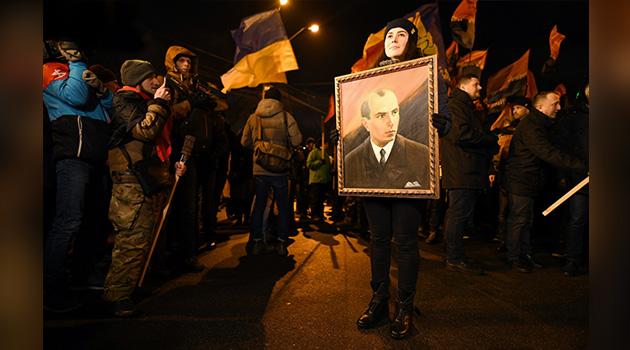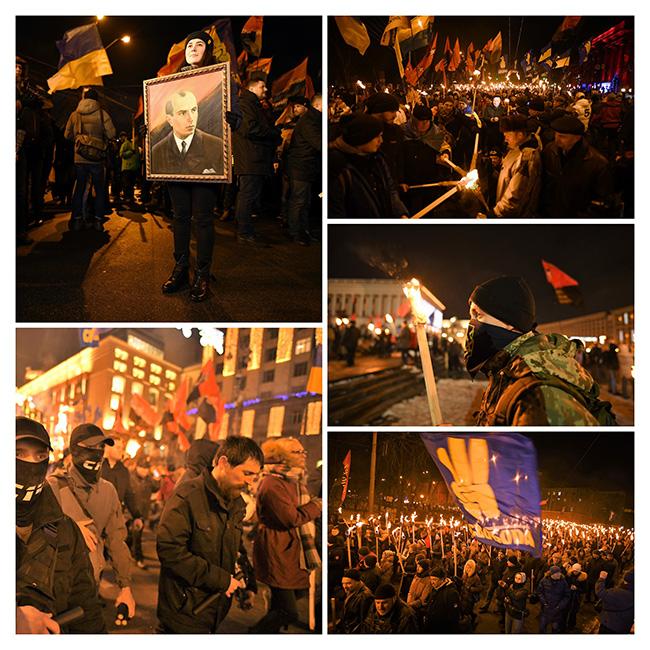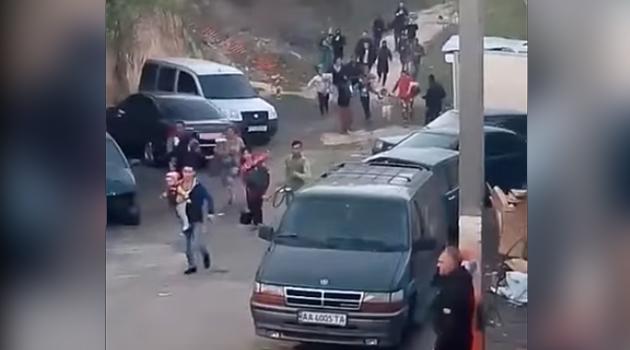Neo-Nazis from C14 group that assaults Roma march through Ukrainian capital celebrating ultra-nationalist historical figure

New Year’s Day was marked in Kyiv by several thousand people commemorating the 110th anniversary of the birth of Ukrainian nationalist leader Stepan Bandera, although due to an argument among the extremist movements about their support for candidates in the upcoming presidential elections in May, two marches were held instead of a common one as took place in October 2018. The presidential candidate for the xenophobic “Freedom” party, a member of the Right Sector paramilitary organization and the ultra-right group C14, which violently attacked Romani encampments last year, is Ruslan Koshulynskyi.
The presidential candidate for the “National Corpus” movement is also the establisher of the Azov Battalion, Andriy Biletsky. The first march on New Year’s Day march was organized by this group, whose “attack unit” is the militant “National Cooperative”.
Their march was led by a gigantic mascot of a snowman holding a machine gun. Those participating wore camouflage and Santa hats.
“National Corpus is attempting to attract young people with this nice, non-extremist form of protest,” a local journalist commented. The second, better- attended march of several thousand people began one hour later at 18:00 in Shevchenko Park.
PHOTO GALLERY

That march was organized by the extremist paramilitary movement Right Sector in collaboration with the xenophobic “Freedom” party. Most participants carried lit torches, banners in the colors of the Right Sector movement or with the logo of the “Freedom” party, and chanted the name of Stepan Bandera.
That march was also attended by members of the neo-Nazi radical group C14, whose masked members last year repeatedly violently assaulted Romani encampments. Polish media reported that the march on the occasion of the 110th birthday of Ukrainian leader Bandera was apparently just the first of many events honoring the controversial historical figure.
The District Council in Lviv has decided to dedicate this year to Bandera, whom it describes as an “excellent statesman, the leader of the Organization of Ukrainian Nationalists (OUN), and a political prisoner in the concentration camp of Sachsenhausen.” A few days later, the Ambassador of Israel to Ukraine, Joel Lion, said the decision by the council was a shocking one.
“I was shocked to learn of the decision by the District Council of Lviv to declare the year 2019 ‘Stepan Bandera Year’,” the website for the TVN 24 television station quoted the ambassador. “I cannot understand how the glorification of those who directly contributed to such terrible antisemitic crimes is meant to aid in combating antisemitism and xenophobia.”
“Ukraine should not forget about the crimes committed against the Jewish people of Ukraine and should not remember them by expressing respect for the perpetrators,” Lion emphasized. Volodymyr Viatrovych, the head of the Ukrainian Institute of National Remembrance, responded to the diplomat’s objections by saying that it would be “appropriate for the Israeli ambassador to provide facts to support his thesis that ‘Stepan Bandera directly participated in terrible antisemitic crimes’.”
TVN 24 has reported that Bandera was the leader of an OUN faction whose armed unit, the Ukrainian Rebel Army (UPA), bears responsibility for ethnic purges in February 1943 against ethnic Poles living in Halych and Volhynia. Before that, in interwar Poland, Bandera organized terrorist actions against both the Polish state and the Soviet Union, including an assassination attempt on the Soviet Consulate in Lviv in 1933 and the assassination of Polish Interior Minister Bronisław Pieracki in 1934.
Bandera was given the death penalty for assassinating Pieracki, which was later changed to a sentence of life in prison. He escaped prison after Germany and the Soviet Union attacked Poland in September 1939.
On 30 June 1941 Bandera announced the creation of an independent Ukrainian state in Lviv during the Nazi occupation, for which he was arrested by the Germans in July and imprisoned in Sachsenhausen, where he remained until September 1944. After the Second World War, Bandera settled in Germany, living in Munich under an assumed name.
In October 1959 Bandera was murdered by a KGB agent. In 2010, outgoing Ukrainian President Viktor Yushchenko posthumously awarded Bandera the title of “Hero of Ukraine”, but that decree was overturned by the courts.
The granting of the title was protested in both Poland and Russia. Recently, however, a motion was submitted for a resolution by the Ukrainian Parliament calling on Ukrainian President Petro Poroshenko to restore the title to Bandera.
